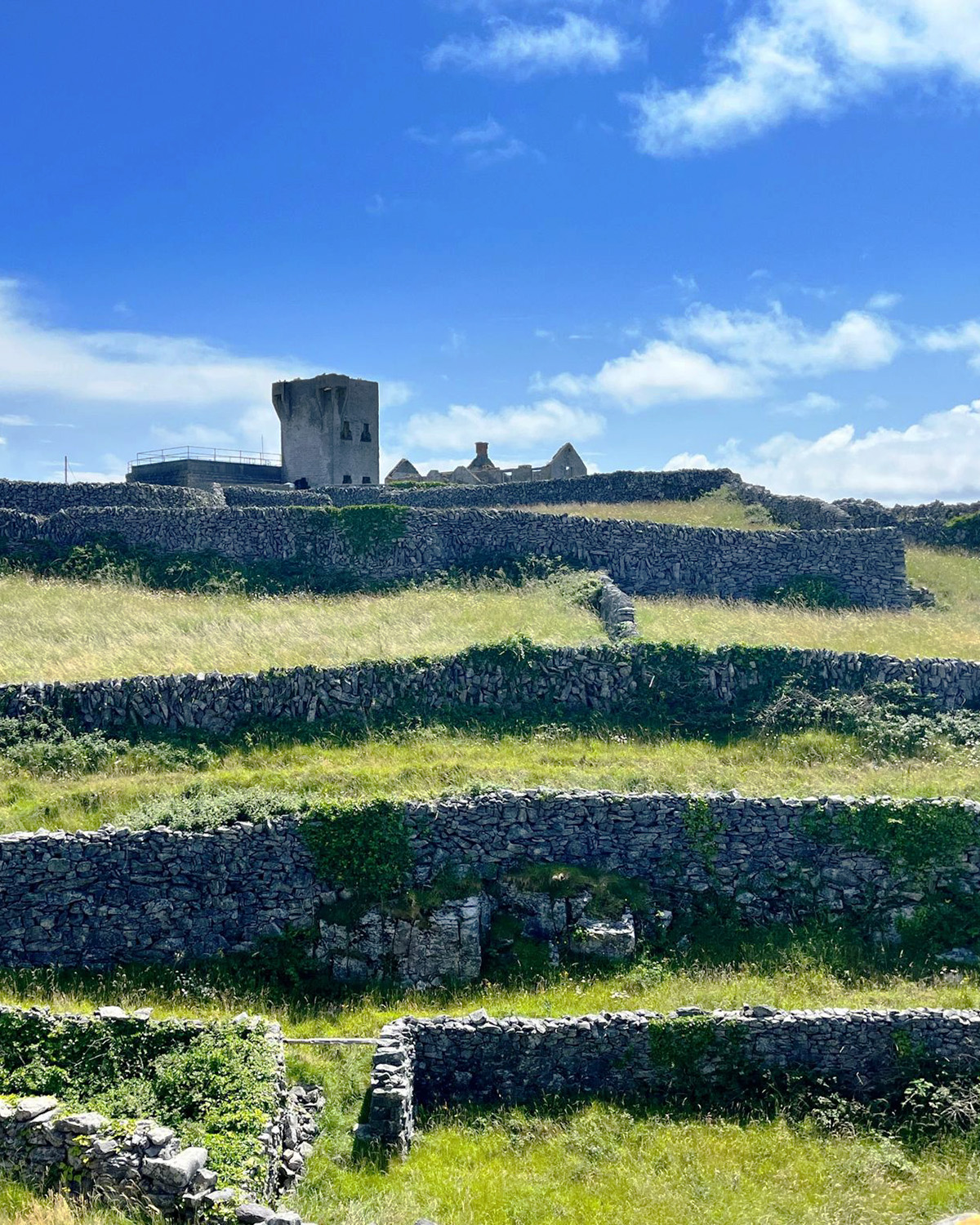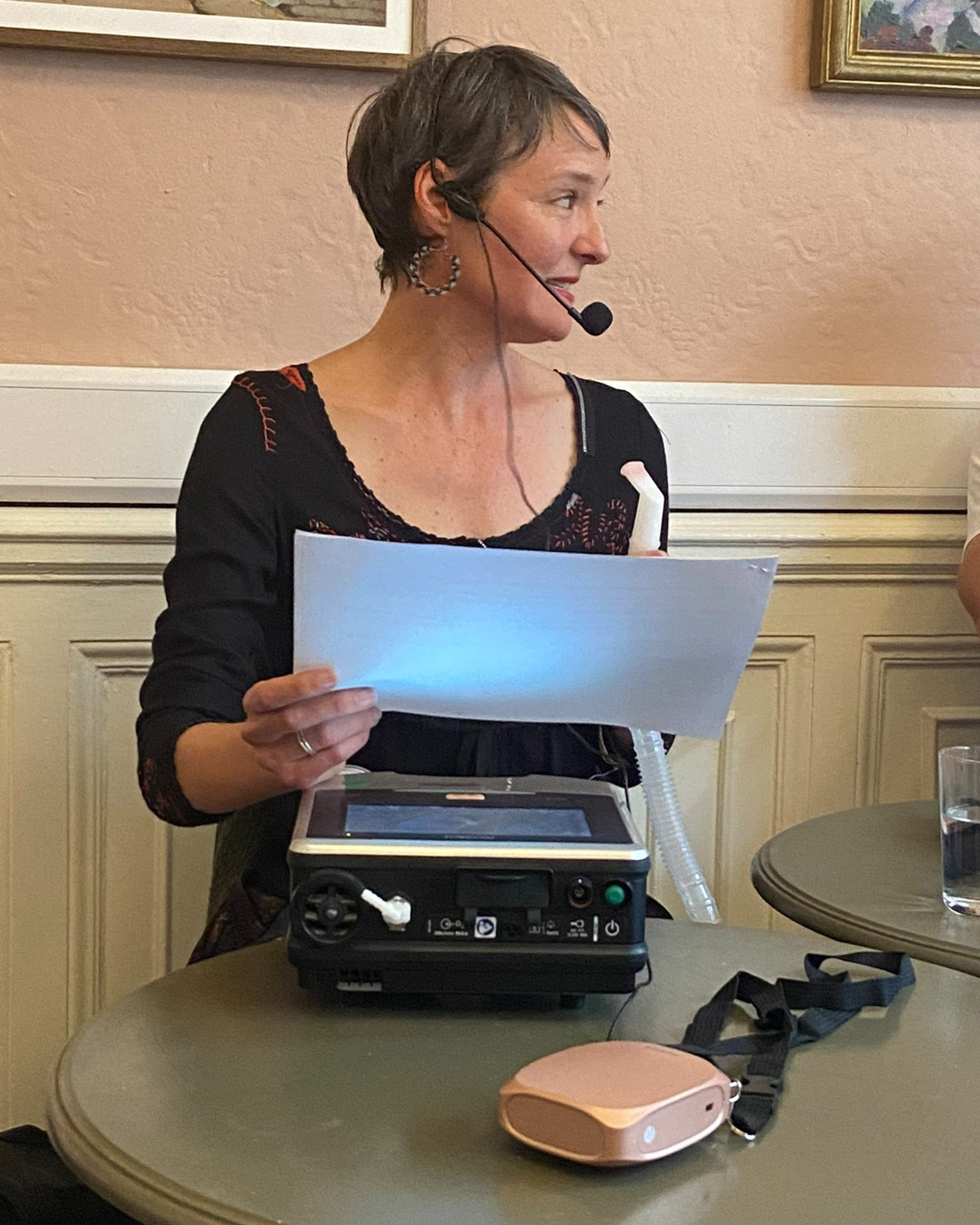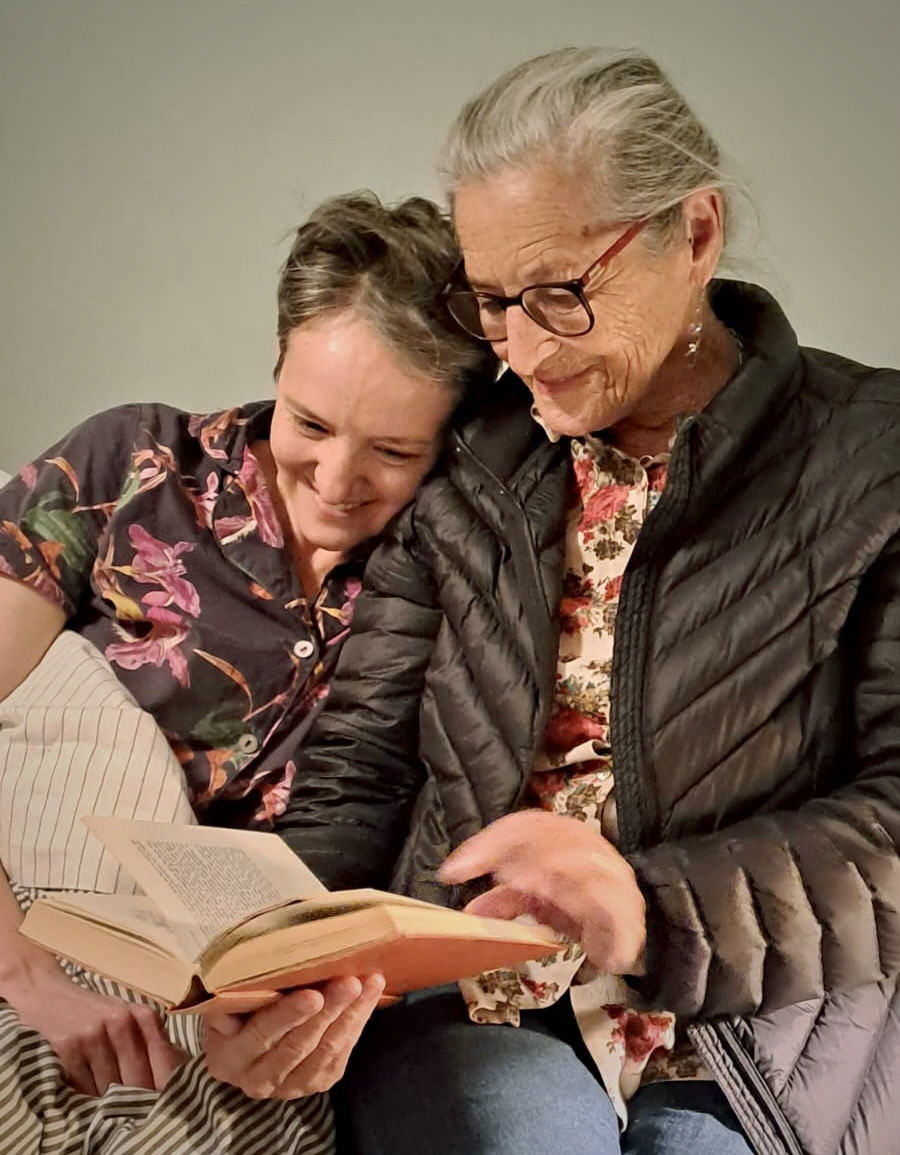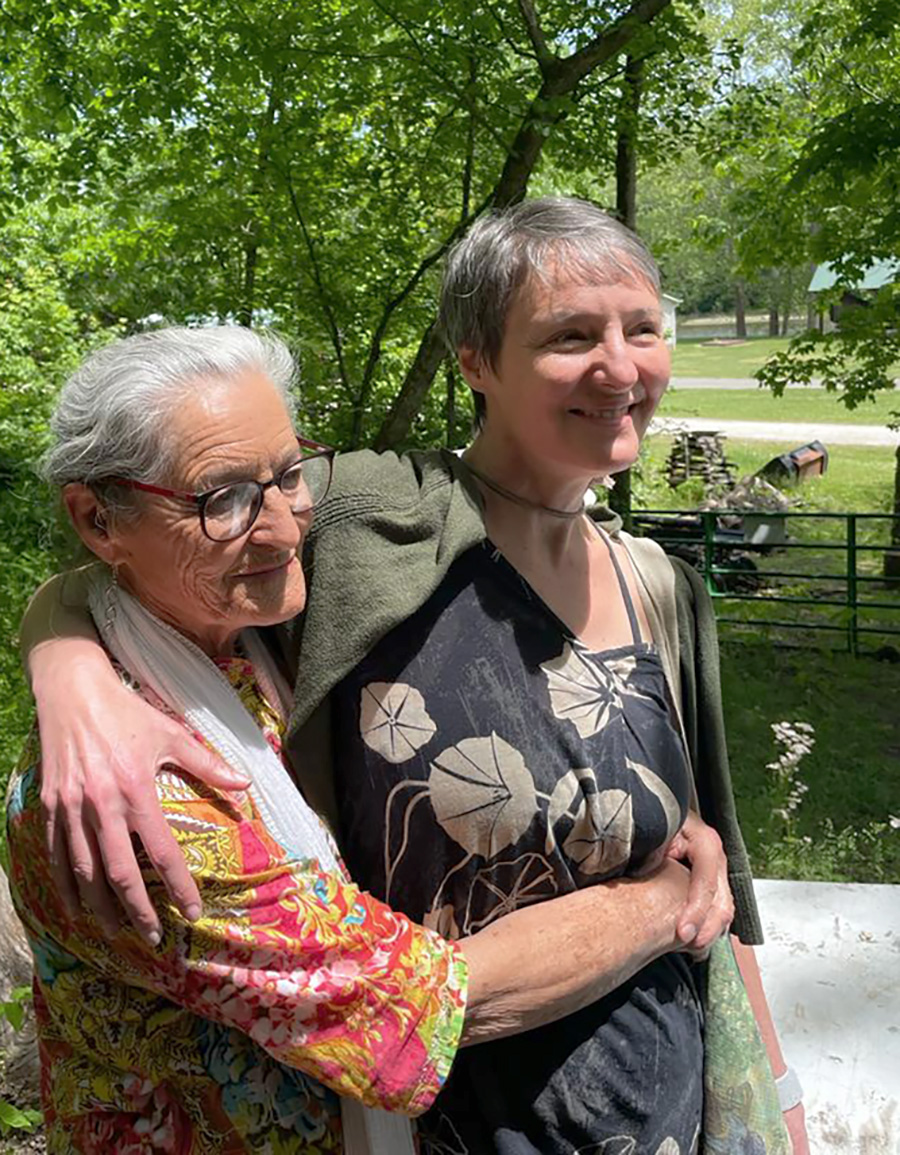In June 2023, Hanna attended a two-week writers’ residency at Trinity College Dublin. She wrote the following after her return.
Oops! You all received notice about this post before it was fully cooked. The words are ready, but the photos aren’t. We’ll replace the duplicate and not-relevant-to-the-story photos in a bit. Meanwhile,… hello! (And a newsy “How’s Hanna?” update is coming soon.)
Beet juice and water
Our two-week writers’ residency at Trinity College Dublin ended with with a weekend in Sligo. After a full week of workshops, we headed to the west coast of Ireland by bus. Most folks packed a small suitcase with clothes and a backpack for books and computers. I too had my suitcase and backpack, plus my ventilator case, a bag with ventilator pipes and my humidifier and a fifth bag with my protein powder, smoothie ingredients and blender.
Thankfully Rachel came over to help me pack, as everything is more difficult with weakening hands and a careful-not-to-fall walk. She helped me carry my bags. For a moment I stood in front of the Graduates Memorial Building surrounded by my five bags, feeling the afternoon sun shining onto me and the solid granite steps. And then, like ants carrying cookie crumbs, my new friends whisked my bags to the bus stop.
The same kind hands repeated this when we arrived at Saint Angela’s College. Everyone settled in, then went into town for dinner. But after a morning of class and a four-hour bus ride I did not have the energy to go. So I stayed in. My room had a view of the lake. The sky and lake were dove gray, as was my mood. There is a particular aloneness in staying behind not because you want to, but because you can’t keep up. At least I had two treats—A beer Matthew gave me on the bus and some droë wors (dried meat sausage) we got when Brian discovered a South African store at our pee stop.
I opened the big window that looked out on Lake Lough Gill. The cool air smelled of moss and pine. I reclined on the couch. Then Edward, who works at St. Angela’s, walked past my window. I needed a wedge to keep a heavy internal door open. I got up to ask if he had any extra door stops. He said he would bring me one. But instead of walking off to get it, he stayed to tell me that he too writes, and how he loves Tolkien, and how the first and second world work. How he believes in ginger and turmeric, but not in mindfulness. How he minds his dreams. I listened while shifting my weight from one leg to the other. When he paused, I took the opening and said, “I don’t have much energy. Please excuse me, I am going to sit down.”
I didn’t sit for very long before there was a knock at my door. There stood Edward, with two door wedges in his right hand, one wood, one plastic. And in his left, a bottle of local beet juice.
“Here,” he said, handing me the juice, “This is good for your energy.” I inspected the bottle of crimson juice. He could tell that I was pleased by his gift and proceeded to tell me of other things that might help with low energy. I told him that my lack of energy is a result of a terminal illness. He didn’t quite know what to say, so he said everything that came to mind. I listened until the end of his story about bee stings that stimulate the lymphatic system that can cure many illnesses. Then I excused myself again.
The next day the beet juice went into my smoothie. But my body was not used to this quantity of root vegetable essence. During dinner on Saturday evening it felt like someone was stitching my stomach lining to my diaphragm. I couldn’t finish my dinner. Back at home, my travel companions heard about my discomfort and told me to wait outside their dorm. One came back with ginger tablets, the other with peppermint oil. The oil mixed with water soothed me to sleep. As I settled, the corners of my mouth turned upwards.


First-hand lake, second-hand sea
On Sunday morning Rachel walked me down to the lake. It was warm enough to swim! Donna held up a towel to create a changing room for me. I was for this water like a desert was for rain. I couldn’t get in quickly enough. But the ragged rocks bit into my feet, soft from city shoes. I was afraid I’d fall. Sienna offered her flip flops. M. and C. took my hands and walked with me until I could lower myself into the bosom of the lake to be caressed by the silky water.
There are no words for how much I love to swim.
C. walked me all the way out of the lake and then returned to swim some more. I hurriedly dried myself, as I still needed to pack before we left. Again M. helped me carry my things to the bus.
The lady at reception said, “Please come back!” I replied, “I definitely will.” It was not quite a lie. My heart really wanted to. But my body, this body, is dying. Then Edward came up to shake my hand and said confidently, “I will see you again, Hanna.”
Part of our group was staying behind to go swim in the ocean—something I longed for just as much if not more than swimming in the lake. But I didn’t have the energy. I dragged myself to the back of the bus. I wanted to come back. I wanted to swim in the Atlantic and have dinner at B.’s place, then take the train back to Dublin. I wanted to, but I could not. B. came to hug me goodbye. A small storm of loss rumbled through me and spilled into public view. R. came and sat beside me, put her hand on my back, and offered me a tissue..
On Monday, back in the air-conditioned classroom of Trinity College, T. took a seat next to me. She is one of the people who stayed in Sligo to visit the ocean. When the reading ended she handed me a tiny see-through shopping bag. In the bag were three shells she picked up at the beach. I held one to my ear and I heard the song of the sea. My heart swelled and tingled like bubbles on a breaking wave.
That night I woke up in the wee hours unable to return to sleep. I reached for the large shell. It fit snugly in my hand. I rested my thumb in the smooth opening. My phone played the sound of the ocean and I imagined myself being carried.


Circles of care (one of them the moon)
On our second-to-last evening, we had a student reading at Books Upstairs. The shop greeted me with that good old bookshop smell. To my right was a table with all the classics bound in colorful fabric. My fingers itched for them, but I walked past and up the wooden stairs to a small salon style space with tall windows overlooking D’Olier Street.
Each student got to read for up to four minutes. I felt proud of the people around me. When it was my turn, I put on a tiny mic and ramped up the volume on my little speaker. I used my ventilator to help me take generous breaths after reading each paragraph. The audience had a printout so they could follow along. My friend M. bought me the Lady-Gaga-style mic and formatted the printout. Many friends contributed for me to afford the ventilator.
To be heard even as my words become mush and voice recedes is to be validated as a whole person.
After the reading we went to a pub. T. got up and offered me her seat. B. put half a pint of Guinness beside me. One of the mentors that I hadn’t met pulled her chair close to mine. She told me about a friend of hers who had passed away from ALS. We proceeded to have a lively conversation that helped me feel seen and heard, even though I was using mostly a pen and paper and occasionally my phone to communicate. When she got up, she wrote down her email address and said, “Please. Please email me. I am here for you in any way I can be.”
After the excitement of the evening wore off and the beer settled in, we realized that the kitchen had already closed. It was past my bedtime (I had been really good at getting to bed early!) but my hunger drove me into the street with the rest of the crew. The only place close and open was an American diner!
After a burger and fries we made our way back to Trinity, our fingers sticky with ketchup. It was after 11pm. I was grateful for B.’s arm that held me steady as we walked through the bustling street, over bumpy pebble stones and alongside a man clearly high on something. We arrived at Trinity where many of our group stood gathered under the hundred foot high stone constructed bell tower. Our program said that there would be a rose moon reading at midnight, but I had no hope of being awake then. I was barely awake as I stood there, so I headed for my bedroom.
It was, and is, difficult for me to discern how much I can do without overextending myself. Once in my room and ready for bed, I felt a longing for the gathering. So I zipped my coat over my pajamas, slipped the room key into my pocket, and went out to find them. The group of writers had formed a circle under the tower. Inside that was a smaller circle made of fresh cut roses, and in the center were candles.
I arrived at a special moment, I could tell. The circle opened and drew me in. Later I heard that moments before my arrival the group offered prayers and wishes for my health. Standing there, braided into the ring, I was given the candle and the opportunity to set an intention for the new moon. All I could think as I was being held so tenderly by this group was, “Thank you, thank you, thank you.”


The kindness of life in loss
After check-in for my flight home, the lady at the counter ordered a wheelchair. I waited in the designated area. The gentleman who came to get me arrived too soon. “May I have three minutes to say goodbye to my friend, please?” I asked. “Of course,” he replied. “Take your time.”
Amelia, a friend from highschool, picked me up after the residency and we had a fabulous four days on the west coast of Ireland. Both of us grew up in a world with no tolerance for tears. And now, here we were at Dublin airport about to say goodbye whilst both of us knew this might very well be the last time we saw each other. My tear tide was already rising.
“Well,” she said, “I think we can do what we were taught to do. We sweep the fact of your illness under the rug and pretend it doesn’t exist.”
“Let’s do that.” I replied. We leaned into a long hug.
I said, “Come visit in Pittsburgh.”
She said, “See you when you travel through London again.”
We disengaged from the hug and I sat down in the wheelchair. James the gentleman helper wheeled me off. I felt empty, as if a tide had pulled back leaving only a vacuum pulling at my throat. Waiting for the elevator doors to open, I saw Amelia out of the corner of my eye. She had followed us. She stood there, blue Café Nero coffee cup in hand, smiling. I smiled back.
Then the doors opened, and James pushed me into the small space. I looked back over my shoulder and Amelia appeared within view. She waved, I waved. As the stainless-steel doors slid closed, Amelia kept moving to hold my gaze until the door snipped our eye contact like scissors and the escalator started to ascend. The corners of my mouth curled down and tears began to roll. I held back a sob. When the doors opened again, I used my sleeve to wipe my eyes. I felt a warm hand on my shoulder followed by, “Are you okay, miss Johanna?” It was James’ voice.
But really it was the kindness of life, meeting me once again.
